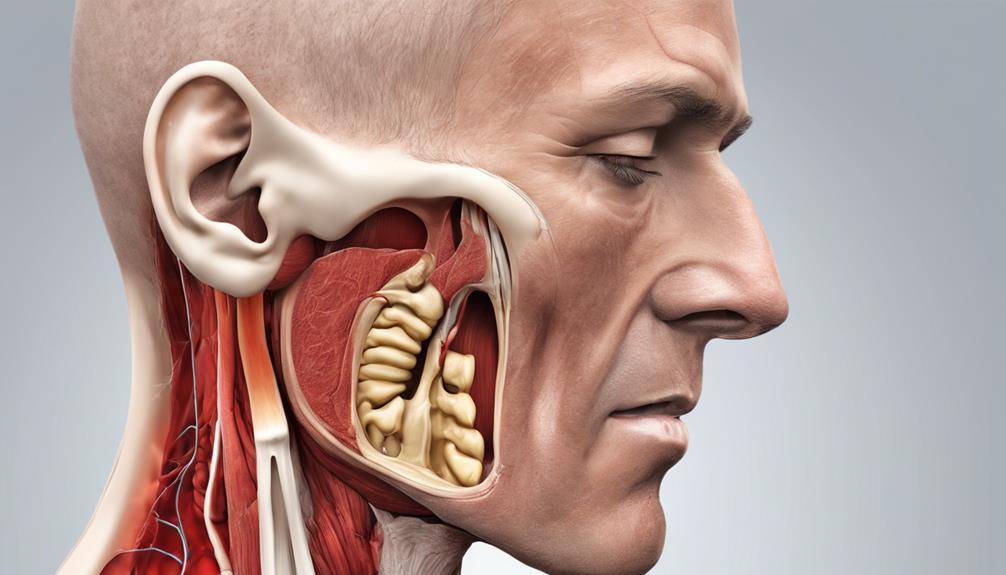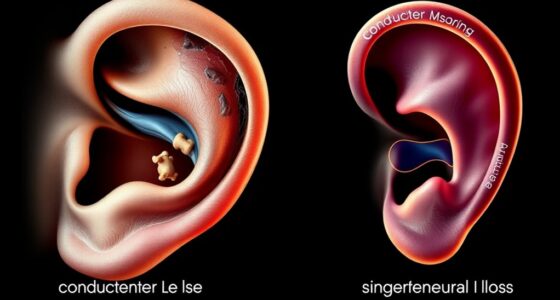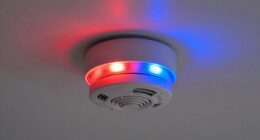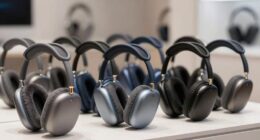Have you ever stopped to think about whether there is a link between your stuffy nose and a decrease in your hearing abilities?
Sinus congestion can be more than just a nuisance; it might be silently affecting your ears in ways you never realized. Understanding the intricate connection between sinus issues and hearing loss could shed light on symptoms you might have brushed off as unrelated.
So, next time you feel that pressure building up in your sinuses, consider how it might be influencing your auditory world.
Key Takeaways
- Sinus congestion leads to Eustachian tube dysfunction, causing temporary hearing loss.
- Untreated sinusitis can result in permanent hearing damage.
- Prompt management of sinus congestion is crucial for ear health.
- Timely treatment and prevention can help avoid hearing complications.
Sinus Congestion and Hearing Loss Connection
Sinus congestion directly impacts hearing by causing Eustachian tube blockage, leading to ear pressure and temporary hearing loss. The Eustachian tube plays a crucial role in regulating air pressure in the middle ear. When sinuses become congested, the Eustachian tube can become swollen or blocked, disrupting this balance and resulting in ear pressure. This pressure can cause discomfort, affect the ability to hear clearly, and even lead to temporary hearing loss. Individuals may experience a sensation of fullness in the ear, akin to being underwater, as the swollen sinuses affect the ear canal and sound conduction.
Additionally, fluid buildup in the ear due to sinus congestion can further exacerbate hearing difficulties. Managing sinus congestion promptly and effectively is vital to alleviating ear pressure and preventing potential hearing issues. By addressing sinus congestion, individuals can reduce the impact on their hearing, promoting overall ear health and well-being.
Understanding Sinusitis and Hearing Issues

Amidst the intricate relationship between sinusitis and hearing issues lies a crucial understanding of how sinus infections can impact auditory function. Sinusitis, characterized by inflammation of the sinuses, can lead to temporary hearing loss primarily due to the swelling of the Eustachian tube. This tube plays a vital role in regulating air pressure within the middle ear and draining fluids; when swollen, it can impede sound transmission, resulting in a temporary decrease in hearing acuity.
The Eustachian tube's dysfunction caused by sinusitis can create an imbalance in air pressure between the middle ear and the environment, leading to discomfort and muffled hearing. While temporary hearing loss is common with sinus infections, prolonged or severe cases can potentially result in permanent hearing damage, especially if fluid accumulates in the ear. Understanding the connection between sinusitis and hearing problems underscores the importance of timely treatment to alleviate symptoms and prevent long-term consequences on auditory health.
Proper management, including medications, decongestants, and saline sprays, can help resolve sinus issues and mitigate associated hearing impairments. For chronic sinusitis cases, procedures like balloon sinuplasty may be considered to improve sinus drainage and potentially enhance hearing outcomes.
Symptoms of Sinus Congestion Impacting Hearing
Symptoms of sinus congestion impacting hearing can manifest as ear pressure, muffled sounds, and a sensation of underwater hearing.
- Middle Ear Infection: Sinus infections can lead to middle ear infections, causing further complications in hearing.
- Eustachian Tube Dysfunction: Sinus congestion can affect the Eustachian tubes, leading to difficulties in equalizing pressure in the middle ear.
- Conductive Hearing Loss: Sinus issues can result in conductive hearing loss, where sound waves aren't conducted effectively to the inner ear.
- Tinnitus: In some cases, sinus congestion can trigger tinnitus, a condition characterized by ringing or buzzing sounds in the ears.
These symptoms highlight the significant impact sinus congestion can have on hearing health. Understanding these manifestations is crucial in identifying and addressing potential issues early. Proper management of sinus congestion is essential to prevent complications such as middle ear infections and hearing loss.
Managing Sinus Congestion-Related Hearing Problems

Exploring effective management strategies for addressing sinus congestion-related hearing problems involves seeking guidance from an ENT specialist for comprehensive evaluation and tailored treatment options. When sinus congestion affects the Eustachian tubes, it can lead to symptoms like ear pressure, partial hearing loss, and muffled sounds. Prompt action is crucial to prevent potential long-term hearing issues. Home remedies such as humidifiers, nasal sprays, and warm compresses can help alleviate sinus congestion and associated hearing problems. However, consulting with an ENT specialist is essential for a proper diagnosis and personalized treatment plan. The table below summarizes key management strategies for sinus congestion-related hearing problems:
| Management Strategies | Description | Benefits |
|---|---|---|
| Consult an ENT Specialist | Comprehensive evaluation and tailored treatment options | Accurate diagnosis and care |
| Use Home Remedies | Humidifiers, nasal sprays, and warm compresses to alleviate congestion | Symptom relief and improved comfort |
| Address Sinus Congestion Promptly | Early intervention to prevent potential long-term hearing issues | Minimize risk of permanent damage |
Preventing Hearing Loss Due to Sinus Issues
What steps can be taken to prevent hearing loss associated with sinus issues? When addressing sinus infections to prevent potential hearing loss, several key strategies can be employed:
- Prompt Treatment: Timely management of sinus issues is crucial in averting potential hearing complications.
- Medication and Decongestants: Proper use of medications and decongestants can help alleviate sinus congestion, reducing the risk of hearing loss.
- Balloon Sinuplasty: In cases of chronic sinusitis, considering balloon sinuplasty may be beneficial in preventing long-term impacts on hearing.
- Timely Intervention: Untreated sinus infections can lead to compromised hearing, emphasizing the importance of promptly seeking medical treatment.
Frequently Asked Questions
How Do You Relieve Sinus Pressure in Your Ears?
When we experience sinus pressure in our ears, we can find relief by applying warm compresses, using nasal decongestant sprays, and performing gentle jaw movements. These methods help reduce inflammation in the Eustachian tubes and promote drainage, effectively alleviating ear pressure.
Additionally, using saline nasal sprays, chewing gum, or yawning can also help equalize pressure in the ears and provide relief from sinus congestion.
How Do You Fix Hearing Loss From a Sinus Infection?
When faced with hearing loss due to a sinus infection, we pivot swiftly to solve the issue. Prompt treatment with decongestants and saline spray often leads to restored hearing.
However, chronic sinusitis demands careful attention to prevent permanent damage. Balloon sinuplasty emerges as a viable option to relieve pressure and enhance hearing.
Diligent management of sinus infections is vital to prevent hearing complications and bring back normal auditory function.
How Do You Unclog Your Sinuses?
When we experience sinus congestion, several methods can help unclog our sinuses.
Using a saline nasal spray or irrigation effectively clears the sinuses.
Steam inhalation aids in loosening mucus, while over-the-counter decongestants provide temporary relief.
Applying a warm compress reduces swelling, and elevating our head while sleeping prevents mucus buildup.
These strategies can effectively alleviate sinus congestion and promote overall sinus health.
How Do You Unclog Your Ears From Sinus Congestion?
When dealing with ear clogs from sinus congestion, we can try gentle techniques like:
- Tilting our head
- Tugging the ear lobe
- Applying warmth
- Using the Valsalva maneuver
Over-the-counter ear drops or staying hydrated may also help. These methods can aid in unclogging the ears and relieving pressure caused by sinus issues.
It's important to address these symptoms promptly to prevent any potential hearing loss.
Conclusion
After delving into the connection between sinus congestion and hearing loss, it's clear that sinusitis can indeed lead to temporary hearing issues. Understanding the symptoms and managing sinus congestion promptly is crucial in preventing potential hearing loss.
By addressing sinus issues promptly with the help of ENT specialists and employing effective home remedies, individuals can alleviate symptoms and maintain optimal ear health. It's essential to prioritize sinus health to safeguard overall hearing well-being.










